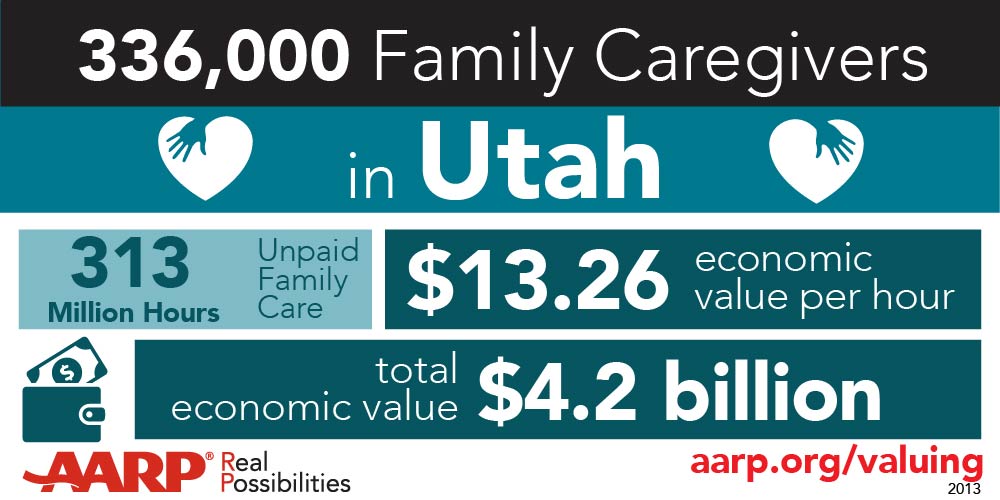AARP Hearing Center

in Unpaid Care According to AARP Study
New report reveals stress on family caregivers’ health and finances; identifies policies to help support caregivers
WASHINGTON, DC — Family caregivers in Utah provided 313 million hours of care—worth an estimated $4.15 billion—to their parents, spouses, partners, and other adult loved ones in 2013, according to AARP Public Policy Institute’s new report, Valuing the Invaluable: 2015 Update. The total estimated economic value of uncompensated care provided by the nation’s family caregivers surpassed total Medicaid spending ($449 billion), and nearly equaled the annual sales ($469 billion) of the four largest U.S. tech companies combined (Apple, Hewlett Packard, IBM, and Microsoft) in 2013.
Family caregiving for relatives or close friends with chronic, disabling, or serious health problems so they can remain in their home is nearly universal today. In 2013, about 336,000 family caregivers in Utah helped another adult loved one carry out daily activities (such as bathing or dressing, preparing meals, administering medications, driving to doctor visits, and paying bills).
“This new report demonstrates that we need to do more to assist the 336,000 caregivers in our state,” said AARP Utah State Director Alan Ormsby. “Some of the things that will help family caregivers include improved workplace flexibility, respite care, tax credits and home care services. AARP Utah is working with policymakers right now to see more duties delegated from nurses to home health care workers to ease some of the burdens on caregivers, who otherwise have to perform these functions themselves.”
Family Caregivers in the Future
As Americans live longer and have fewer children, fewer family members will be available for older adults to rely on for everyday help in the future. The ratio of potential family caregivers to the growing number of older people has already begun a steep decline. In 2010, there were 7.2 potential family caregivers for every person age 80 and older. By 2030, that ratio will fall sharply to 4 to 1, and is projected to drop further to 3 to 1 in 2050.
Impact of Caregiving on Jobs, Money, and Health
Family caregivers report that the stress of caregiving affects their physical and emotional health, finances, and their jobs.
- More than half (55%) of family caregivers report being overwhelmed by the amount of care their family member needs.
- Nearly 4 in 10 (38%) family caregivers report a moderate (20%) to high degree (18%) of financial strain as a result of providing care.
- In 2014, the majority (60%) of family caregivers had full- or part-time jobs.
Strategies and Policies Needed to Help Caregivers
“AARP Utah supports the three-fold purpose of the CARE Act,” said Ormsby. “First, patients may designate a family caregiver upon admission. Second, hospitals will keep the designated caregiver informed of major decisions, like discharging or transferring the patient. Finally, when the patient is discharged, hospitals will provide instructions on the medical tasks a family caregiver may need to perform at home. These three simple steps will lead to better outcomes for the patient, and reduced stress for the family caregiver.”
Ormsby added, “We also need to work on a broader plan that involves both the public and private sectors to support family caregivers here in Utah.” According to a previous study issued by AARP with the SCAN Foundation and the Commonwealth Fund, Raising Expectations 2014: A State Scorecard on Long-Term Services and Supports for Older Adults, People with Physical Disabilities, and Family Caregivers Scorecard, Utah ranked 50 th for its support of family caregivers, which is a composite indicator looking at legal supports and stress levels, among other factors.
“Valuing the Invaluable: 2015 Update” Methodology
The estimates in this report by AARP’s Public Policy Institute are based on a meta-analysis of 11 U.S.-based surveys of family caregivers conducted between 2009 and 2014. Estimates are based on about 40 million caregivers providing an average of 18 hours of care per week to a parent, spouse/partner, or other adult loved one, at an average value of $12.51 per hour. ‘Caregiver’ is defined as an adult age 18 and older providing care to a parent, spouse, or other adult loved one with their daily activities such as bathing or dress, preparing meals, and/or managing their finances, currently or within the last month. A full copy of the report can be found at aarp.org/valuing.
Caregiving Resources:
- AARP Caregiving Resource Center
- Caregiving in the US: 2015 Report
- Home Alone: Family Caregivers Providing Complex Chronic Care (October 2012)
- The ABA/AARP Checklist for Family Caregivers: A Guide to Making It Manageable (2015)
- Amy Goyer’s ABA/AARP Juggling Life, Work and Caregiving (2015)
- AARP’s I Heart Caregivers Initiative
# # #
About AARP
AARP is a nonprofit, nonpartisan organization, with a membership of nearly 38 million, that helps people turn their goals and dreams into real possibilities, strengthens communities and fights for the issues that matter most to families such as healthcare, employment and income security, retirement planning, affordable utilities and protection from financial abuse. We advocate for individuals in the marketplace by selecting products and services of high quality and value to carry the AARP name as well as help our members obtain discounts on a wide range of products, travel, and services. A trusted source for lifestyle tips, news and educational information, AARP produces AARP The Magazine, the world's largest circulation magazine; AARP Bulletin; www.aarp.org ; AARP TV & Radio; AARP Books; and AARP en Español, a Spanish-language website addressing the interests and needs of Hispanics. AARP does not endorse candidates for public office or make contributions to political campaigns or candidates. The AARP Foundation is an affiliated charity that provides security, protection, and empowerment to older persons in need with support from thousands of volunteers, donors, and sponsors. AARP has staffed offices in all 50 states, the District of Columbia, Puerto Rico, and the U.S. Virgin Islands. Learn more at www.aarp.org .































































